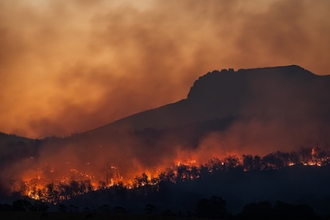CAFOD calls on G7 to grip climate crisis, before it's too late

Bushfires below Stacks Bluff, Tasmania, Australia. Photo by Matt Palmer on Unsplash
Since the G7 last met in June 2022, people around the world have suffered time and time again from the deadly consequences of the climate crisis. CAFOD, is calling on world leaders who are meeting on the 19 May to step up and grip the climate crisis before more lives are lost.
In Pakistan, floods affected millions, taking thousands of lives and wiped-out homes and destroyed livelihoods.
In East Africa, a devastating drought is entering its 6th consecutive year causing a deadly food crisis. Millions are on the brink of famine, as crops and livestock have been decimated due to lack of water.
Out of control wildfires have swept countries around the world and are becoming an ever increasing threat.
Just a few weeks ago, deadly floods hit the people of DR Congo. Hundreds of lives have been lost, homes destroyed.
As these devastating weather events prove, the climate crisis is not an abstract threat. It is a daily reality for millions, especially in the poorest countries who have contributed nothing to the climate crisis.
The world cannot afford for the G7 to drag its feet any longer. World leaders, like Rishi Sunak, need to grip the crisis before it's too late, by phasing out fossil fuels, committing to tackle the food crisis and stop countries being straddled with debt.
CAFOD is calling for the G7 to:
- Phase out fossil-fuels. G7 leaders need to stop funding fossil fuels once and for all. That means stop opening new oil and gas fields and it means investing in clean and green energy.
- Fight famine with funding. East Africa is on the brink of famine, yet world leaders are failing to step up. We need new and additional funding to stop famine from breaking out and taking millions of lives.
- Drop the Debt. Private creditors and banks like Blackrock are making money off the backs of countries being destroyed by the climate crisis. The G7 should force them to cancel debts to poorer countries.
- Ahead of the G7 meeting on the 19 May, CAFOD's Graham Gordon called on world leaders to grip the crisis before it's too late.
Graham Gordon, head of public policy for CAFOD, said: "The G7 has repeatedly failed the world's poorest countries by failing to grip the climate crisis. While world leaders have their heads buried in the sand, lives are being lost. Floods killed thousands of people in Pakistan and DRC, in Kenya and Somalia millions are on the brink of famine because of drought.
"We cannot afford any more delay. We cannot afford any new oil and gas fields being opened, we need clean and green energy now. The G7 needs to get a grip of the climate crisis by phasing out fossil fuels, funding the fight against famine and stopping private banks from clawing back debt repayments from countries who are suffering from a climate crisis they did not cause."
Banks and investors have consistently refused to cancel debts of poorer nations, which has further deepened the global debt crisis. This has meant countries have had to choose between paying for repairing the damage of the climate crisis they did not cause or face being sued.
Blackrock, and other creditors, should agree to cancel Zambia's debt. The country has been in default since 2020 leaving the Zambian economy in limbo, while Blackrock post enormous profits each year.
The 49th G7 Summit will take place Friday 19 May to Sunday 21 in May in Hiroshima, Japan.
Key stats:
Famine looms for the people of East Africa.
Over 36 million people are suffering from hunger, and over 21 million require food assistance.
More than 345 million people face high levels of food insecurity globally in 2023 - more than double the number in 2020.
Last year, the UK gave just one-fifth of the aid provided to East Africa during the last hunger crisis in 2017-18.
LINK
CAFOD: https://cafod.org.uk/


















